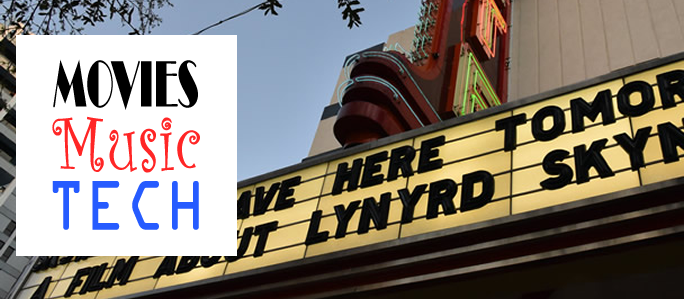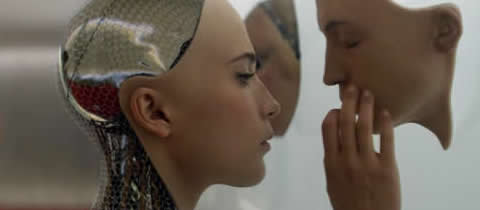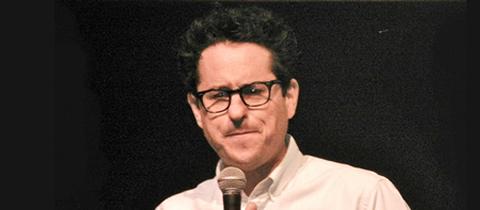(Originally published on Blogcritics.org)
Flexing the mental muscles of this year’s SXSW attendees are debates about robots and Artificial Intelligence (AI). Both Interactive sessions and films shed light on this topic.
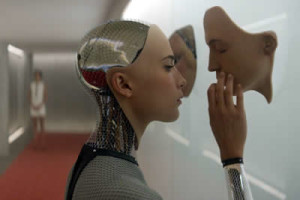
Ex Machina, written and directed by Alex Garland (28 Days Later, Dredd), tells the story of a young programmer working for an Internet search giant who is selected by the company’s CEO to conduct a Turing test on his latest experiment.
To conduct this test, the programmer, played by Domhnall Gleeson (About Time, Harry Potter and the Deathly Hallows: Part 2), is taken by helicopter to the remote home/research facility of the reclusive CEO, played by Oscar Isaac (Inside Llewyn Davis, A Most Violent Year ). The subject of the experiment is the robot named Ava, played by Alicia Vikander ( A Royal Affair, Seventh Son). She is, of course, a very sexy robot (Two nerds and a sexy robot. Does anyone remember Weird Science?).
As one might expect, the experiments do not go smoothly. But this is not just another rehashing of theFrankenstein story in which the creation of the mad scientist turns on its maker. (No offense to Mary Shelly, it was great when she wrote it.) Instead we are presented with a narrative which asks serious questions about what it means to be conscious and to be human.
However, Writer/Director Garland does not make us listen to long monologues about the meaning of life. This is a much better film than that. Each of the questions raised is in the context of the plot and moves the story along. Thematically and stylistically the film reminded me, and other audience members, of 2001: A Space Odyssey. Ex Machina is great sci-fi and deserves to be in the company of the Kubrick classic.
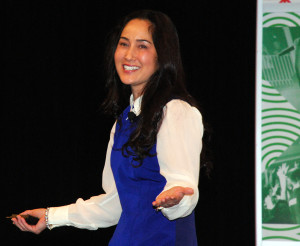
But, unlike the HAL 9000, Ava never says “I’m sorry, Dave. I’m afraid I can’t do that.” She doesn’t need to. Her AI is much more sophisticated and deep. Designed to be helpful in a variety of ways, her programming allows her to become involved in a multi-level battle of wills and deception between her, the programmer and the CEO.
As I watched, I kept being drawn back to the SXSW Interactive presentation I’d seen a couple of days earlier, by MIT professor Cynthia Breazeal, “Getting Personal with Robots”. Breazeal is also founder and CEO of Jibo, Inc., a company formed to build commercial robots. She is passionate about the future of robots as a household appliance which she believes should be as ubiquitous as toasters.
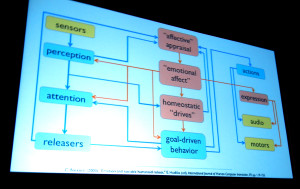
Her description of experiments run to measure human reactions to personal robots indicates that the technology which can create responsive, emotionally appealing robots is approaching a commercial level of viability. No, not as sophisticated as Ava in Ex Machina, but at least as functional as the mechanical assistant in another film, Robot & Frank, in which a group of siblings buy a robot to take care of their aging father, played by Frank Langella.
During Breazeal’s talk I tweeted a question, but apparently not in time to make it into the queue.
#askCynthia Are these robots sociopaths? Understanding, mimicking, manipulating human emotion, but not feeling.
Watching Ava manipulate the two computer experts made me even more suspect about the ultimate utility of personal robots. Of course humans would never do anything as creepy as robot Ava, unless of course, the promoters of Ex Machina created a phony identity for Ava on Tinder and used it to entice men to look at her bio which linked to their movie site.
Tomorrow I’ll go see the SXSW premier of the first episode of Mr. Robot. Silly humans. Shutting down now.
